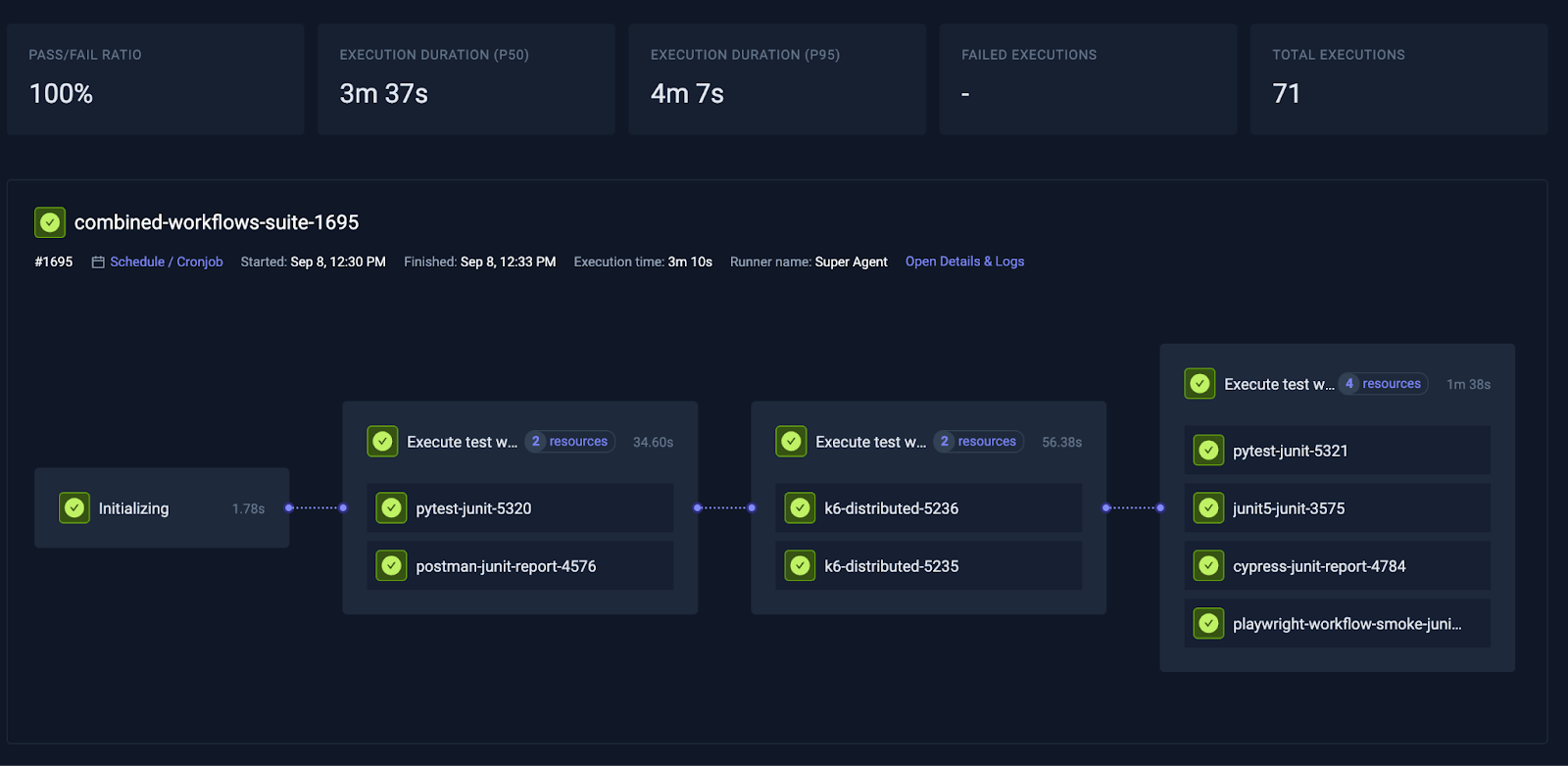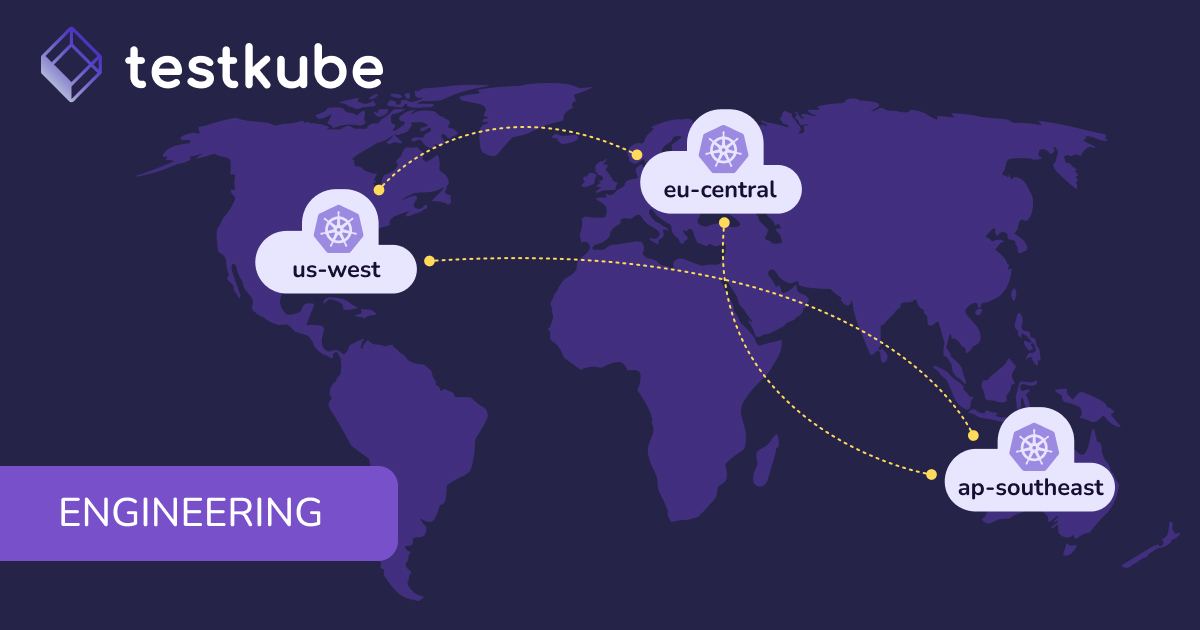

Table of Contents
Try Testkube instantly in our sandbox. No setup needed.
Try Testkube instantly in our sandbox. No setup needed.


Table of Contents
Executive Summary
Your users aren't limited to one city or country. They're spread across the globe, accessing your services from Tokyo to Toronto, from São Paulo to Stockholm. Yet many development teams still test their applications from a single location, often because it's easier, faster, and requires fewer resources to manage. This approach creates a dangerous blind spot that can lead to poor user experiences and costly outages in production.
If you're serving global users, you need geo-distributed testing. Here's why it matters and how Testkube makes it achievable without the traditional headaches.
The Hidden Costs of Single-Location Testing
When you test your application from only one geographic location, you're essentially flying blind about how it performs for the majority of your users. Network latency, regional infrastructure differences, and CDN behavior all vary dramatically across regions. What performs flawlessly for users in Virginia might crawl for users in Singapore or São Paulo.
Traditional approaches to solving this problem have their own challenges:
- Third-party testing platforms like NeoLoad, Blazemeter, or cloud-based solutions promise global coverage but often come with steep costs, security concerns about routing sensitive data through external services, and limited integration with modern DevOps workflows.
- DIY distributed testing setups require significant engineering overhead to build, maintain, and coordinate across multiple regions—time that could be better spent on product development.
- Ignoring the problem entirely is unfortunately too common which leads to poor user experiences and difficult-to-diagnose performance issues that only surface in production.
Testing Where Your Users Actually Are
The solution is straightforward conceptually but can be complex in execution: run your tests from the same regions where your users are located. This gives you realistic performance data that reflects actual user experience, not idealized single-region results.
For teams running applications on Kubernetes, this creates an additional challenge. Traditional testing tools weren't built for containerized, distributed environments, making it difficult to coordinate tests across multiple clusters and regions while maintaining the flexibility and scalability that Kubernetes provides.
This is where Testkube comes in. With Testkube's geo-distributed testing approach, you can leverage your existing Kubernetes clusters across AWS, Azure, GCP, or edge locations to run localized tests. There's no need to route traffic through third-party services or worry about data leaving your infrastructure.
This approach provides several key advantages:
- Real-world performance data that matches your users' actual experience
- Complete infrastructure control with no vendor lock-in or external dependencies
- Better security since test data never leaves your own clusters
- Cost efficiency by using existing infrastructure instead of expensive third-party platforms
Tool Flexibility Without Platform Lock-In
One of the biggest frustrations teams face is when testing platforms force them to abandon their existing tools and completely refactor their test suites to match the platform's requirements. Testkube takes a fundamentally different approach by being completely tool-agnostic.
Whether your team prefers k6 for load testing, Playwright for end-to-end testing, Cypress for UI testing, Selenium for cross-browser testing, or custom scripts tailored to your specific needs, Testkube supports them all. Local agents inside each cluster handle execution while the control plane aggregates results for centralized analysis.
This means you get the flexibility to use the best tools for each job without friction, and you don't need to retrain your team or rewrite existing test suites.
Scaling Reality: Built-In Parallelism and Sharding
Real-world traffic doesn't come from a single source. It arrives from thousands of users simultaneously across different regions and devices. Your testing should mirror this reality. Testkube supports advanced scaling strategies including parallelism, sharding, and distributed execution that make it easy to simulate realistic user loads:
- Parallelism allows you to run multiple test instances simultaneously across different nodes
- Sharding splits large test suites into smaller chunks that execute concurrently
- Distributed execution spreads tests across your entire cluster infrastructure
For example:
- k6 tests can leverage multiple parallel workers for high-concurrency load testing
- Playwright and Cypress tests can be distributed across multiple nodes for faster execution
- Selenium tests can scale across different browser and device combinations simultaneously

These capabilities enable sophisticated testing scenarios that would require significant custom engineering to build and maintain with traditional approaches.
Seamless Integration with Modern DevOps
Geo-distributed testing shouldn't require you to change how your team works. Testkube integrates with your existing DevOps practices, whether you're using CI/CD pipelines, scheduled jobs, or GitOps workflows.
You can trigger geo-distributed tests through:
- Any CI/CD platform (GitHub Actions, GitLab CI, Jenkins, etc.)
- Scheduled cron jobs for regular monitoring
- Kubernetes resource changes for deployment validation
- Direct API or CLI commands for ad-hoc testing
This flexibility means geo-distributed testing becomes a natural part of your development lifecycle, not an external process that requires special handling.
.webp)
Unified Visibility Across All Regions
One of the most powerful aspects of geo-distributed testing is the ability to compare performance across regions simultaneously. With Testkube, all test results, logs, and artifacts are collected and displayed in a single dashboard, giving your team complete visibility into how your application performs globally.

You can easily drill down by cluster, time period, or specific test to troubleshoot issues faster and more effectively. Instead of manually comparing results from different platforms or piecing together logs from multiple sources, you get a unified view that makes regional performance differences immediately apparent.
The Business Case for Geo-Distributed Testing
Beyond the technical benefits, geo-distributed testing delivers real business value:
- Improved User Experience: By identifying and fixing regional performance issues before they reach production, you ensure consistent quality for all users, regardless of location.
- Reduced Risk: Catching region-specific issues in testing rather than production prevents costly outages and reputation damage.
- Better Performance Insights: Understanding how your application performs in different regions helps inform infrastructure decisions and optimization efforts.
- Compliance and Governance: For organizations with data residency requirements, keeping test data within specific geographic boundaries is often essential.
Getting Started with Geo-Distributed Testing
Implementing geo-distributed testing doesn't have to be a massive undertaking. Start by identifying your key user regions and setting up Testkube agents in clusters that serve those areas. Begin with your most critical user journeys and gradually expand coverage as you see the value.
The key is to think of geo-distributed testing not as a separate testing discipline, but as an extension of your existing quality assurance practices. By testing where your users are, you gain confidence that your application will perform well for everyone, everywhere.
With applications serving users worldwide, single-location testing is no longer sufficient. Geo-distributed testing isn't just a nice-to-have feature. It's essential for delivering the reliable, performant applications that modern users expect. With the right continuous testing platform and approach, it's more achievable than ever.
Frequently Asked Questions


About Testkube
Testkube is a cloud-native continuous testing platform for Kubernetes. It runs tests directly in your clusters, works with any CI/CD system, and supports every testing tool your team uses. By removing CI/CD bottlenecks, Testkube helps teams ship faster with confidence.
Explore the sandbox to see Testkube in action.








